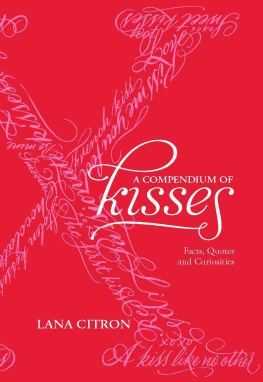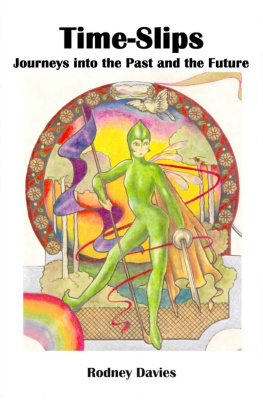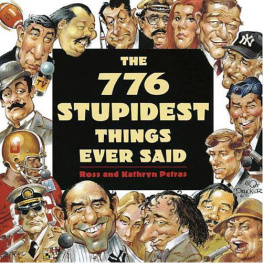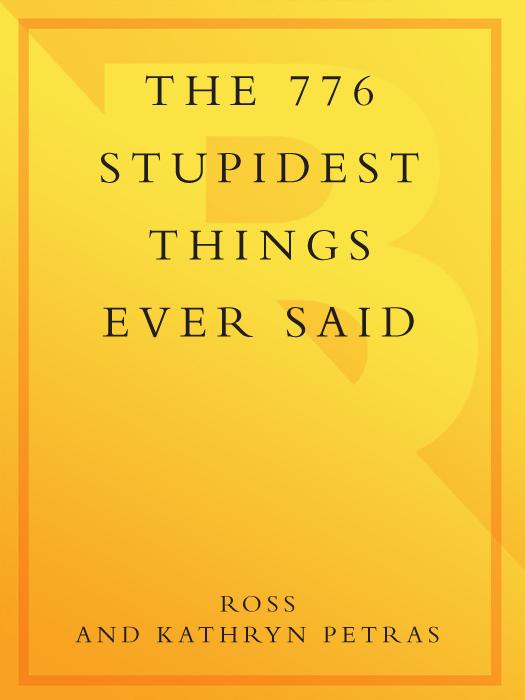Contents
ACKNOWLEDGMENTS
Thanks to everyone who helped make this book a reality, especially:
Bruce Tracy, Robin Rue, Kris Dahl, Paul Bresnick, David Gernert, and Susan Moldowand, of course, to all of the people who contributed their favorite stupidities.
INTRODUCTION
Weve all done it at one time or anotherput our foot in our mouth.
No one is immune to foot-in-mouth disease. People from all walks of life say the wrong thing at the wrong time. Of course, most of us are lucky. When we say something dumb, theres no television camera or newspaper reporter to capture our inadvertent blunders for time immemorial.
But those in the public eye arent quite so lucky. Their verbal gaffes are recorded in the paper, on airand now in this book.
This is a collection of the stupidest, most ridiculous, funny, asinine, and sometimes frankly frightening quotes in historyanything from misstatements to doublespeak to good old-fashioned idiocy.
The 776 Stupidest Things Ever Said is an irreverent look at our pundits, celebrities, politicians, and social leaders and how fallible we all arethem for saying dumb things, us for paying too much attention.
We already have The Guinness Book of World Records, Bartletts Familiar Quotations, and innumerable books listing the best quotations from the best minds in historyfrom Tacitus to Goethe to Gorbachev. So now (to paraphrase Jimmy Carter), Why not the worst?
The quotes weve collected in this book come from a wide range of sourcesfrom daily newspapers across the country to magazines, from television shows to private collections. Along the way, we noticed something interesting: like most things, verbal blunders seem to come and go in cycles. While we always relish hearing or reading them, some eras are riper with them than others.
There have been several Golden Ages (of sorts) of the quotable stupidity. An early Golden Age came in the late 1700s and early 1800s, with Anglo-Irish statesman Sir Boyle Roche leading the pack in the misstatement race. One hundred years later, another Golden Age emergedfocusing on gaffes committed in the British Parliament. Then came the early 1920s and the emergence of a wholly American gaffe-watch, caused in part by the tortured syntactical meanderings of President Warren G. Harding.
The early 1940s brought another Golden Age. This one, like the attention of the American public in general, centered around Hollywood and the blunders of those connected to the Great American Dream Machine. World War II and the Cold War brought about a lull of sorts in the appreciation of the verbal gaffe. Save for periodic breaks (such as during presidential campaigns), irreverence in general was out.
Then came the late 1960s and a completely new American ethos. The youth revolution swept the nation. Suddenly anything and anyone were fair game. Watergate brought this Golden Age to a peak. And we havent come off that peak yet. As Yogi Berra said, It aint over till its over, and it aint yet.
Just as there are Golden Ages of the verbal gaffe, there are the truly silver-tongued who have more of a knack for the inspired malapropism and verbal blunder than others. Thats why weve singled out a few people for special attention: the little-known Sir Boyle Roche, Yogi Berra, Sam Goldwyn, and, more generally, the chief perpetrators of incomprehensible doublespeakbureaucrats and academics.
But most of this book is a cross sectionquotes from people in sports, the arts, the government and the world of business, the famous and the not so famous. Some of the quotes make one think twice about the people in charge of our government, our corporations, our society. Some are clearly mistakes. And others are just plain funny.
And thats really the bottom line. After all, everyone makes mistakesso why not sit back and enjoy them? Read this book as a celebration of the verbal inanities even the best of us make a celebration of our humanity. It is our hope that it will make even the most tongue-tied of us feel better about ourselves. If the best and the brightest can do it and go on to become presidents, kings, and generals, why not me?
A
On Accidence, Causes of:
hazards are one of the main causes of accidents.
from the U.S. Occupational Safety and Health Administrations booklet, Safety with Beef Cattle, 1976
On Actuality:
Things are more like they are now than they have ever been.
President Gerald Ford
On Adages, Modern interpretations of:
As Duke Ellington once said, The Battle of Waterloo was won on the playing fields of Elkton.
Babe Ruth on a radio show, garbling the adage by the Duke of Wellington that Waterloo was won on the playing fields of Eton
On Addresses:
If at any time I change my address when I notify you I hope you will be so kind as to change also.
letter from a reader renewing his subscription, received by the business manager of Motor News
On Adoptions, Reasons Why You May Be Excluded from:
It would seem from the interviews and reports that both of you have had few, if any, negative experiences when children yourselves, and also seem to enjoy a marital experience where rows and arguments have no place. Under the circumstances, [adopted children would not have sufficient exposure to] negative experiences.
letter from the Lancashire (U.K.) Social Services Department, on why foster parents Harry and Esther Hough were not qualified to adopt as they exuded excessive harmony, although they had already raised over forty foster children from birth to age eight
On Advice:
Life its own self, as Dan Jenkins said. Life its own self. Figure that one out, Norm. But what it means is, I have a lot more to learn from President Reagan.
George Bush, at the beginning of his presidency, when asked whether he was getting advice from his predecessor
On Advice, Not So Good:
Dont cut off your nose yourself.
Casey Stengel
On Age:
Bruce Sutter has been around for a while and hes pretty old. Hes thirty-five years old. That will give you some idea of how old he is.
Ron Fairly, San Francisco Giants broadcaster
On Agreeing:
And what is more, I agree with everything I have just said.
attributed to Piet Koornhoff, South African cabinet minister, ambassador to United States
On Agreements:
If I entered into an agreement with that man, I would be sticking my head in a moose.
attributed to movie mogul Samuel Goldwyn
On Air Pares, Free:
Gifts are positively corruptive. [Free air fares] are harmless, or at least only potentially corruptive.
Lee Wilbur, staff aide on the House Appropriations Transportation subcommittee, explaining why it was okay for him to accept a free (first-class) round-trip flight to Spain
On Alliteration, Excessive:
Progression is not proclamation nor palaver. It is not pretense nor play on prejudice. It is not of personal pronouns, nor perennial pronouncement. It is not the perturbation of a people passion-wrought, nor a promise proposed.
President Warren G. Harding










